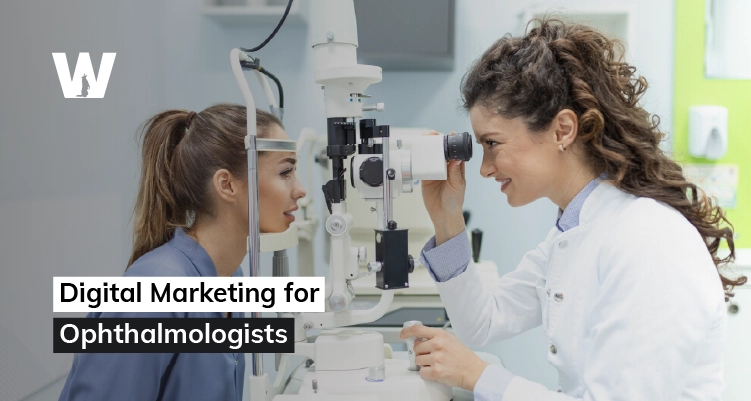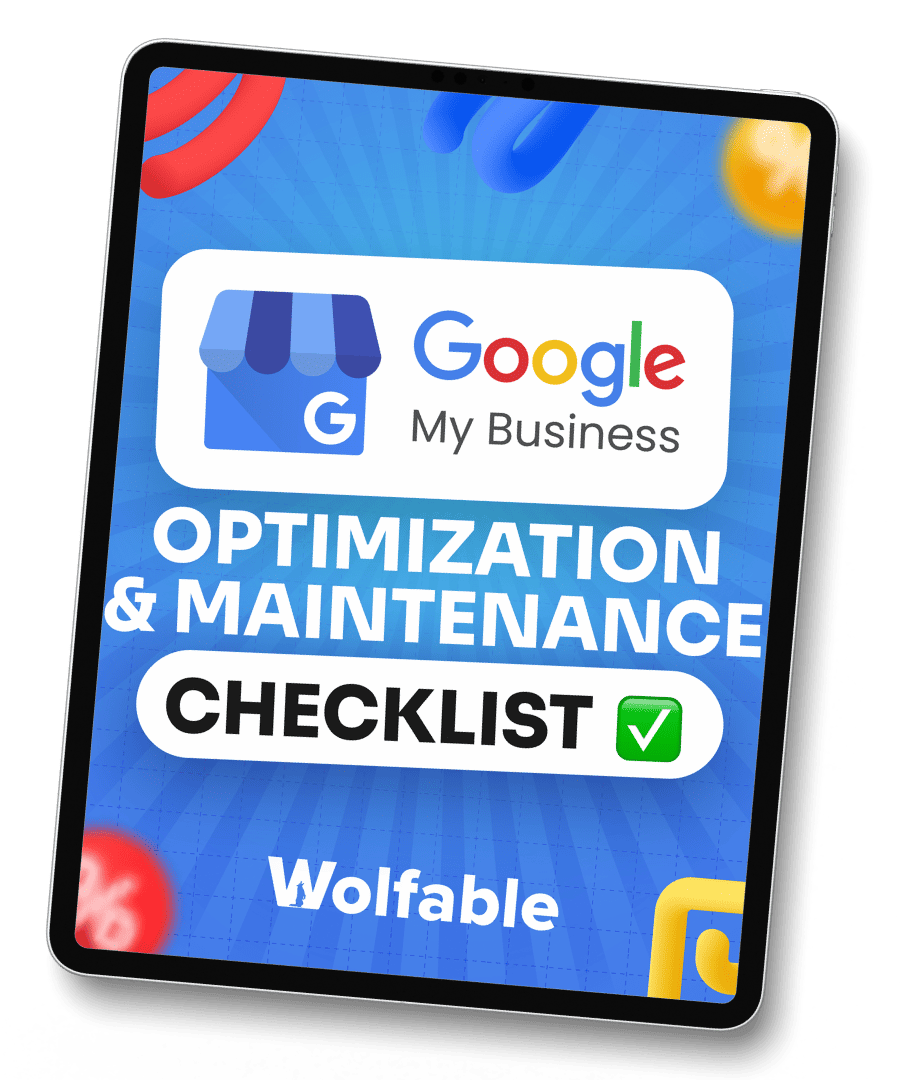Wraps up in 5 Minutes
Introduction
The global eye care market is on the rise, projected to hit $78.9 billion by 2027, fueled by an aging population and increasing eye disorders. Latest estimates suggest that there are 36 million people in the world who are blind, highlighting the urgent need for accessible and effective ophthalmology services.
With more patients turning to online platforms for healthcare solutions, a strong digital presence is crucial for ophthalmologists to remain competitive. By leveraging digital marketing strategies like SEO, PPC, and social media, ophthalmologists can enhance their visibility, educate patients, and drive more appointments while building lasting trust.
The growing prevalence of eye conditions such as cataracts and digital eye strain emphasizes the need for proactive patient outreach. Effective online marketing not only helps ophthalmologists attract and retain patients but also positions them as leaders in providing top-notch eye care.
In this comprehensive guide, you'll discover why online marketing for ophthalmologists is crucial for your practice's growth and sustainability.
Why Digital Marketing is Crucial for Ophthalmologists
Digital marketing has become a necessity for ophthalmologists as patient behavior and expectations continue to evolve. With increasing competition and the growing reliance on online platforms to find services like eye checkups, LASIK surgery, and eye specialists, having a strong digital presence is crucial for any ophthalmology clinic or eye hospital to succeed.
- Adapting to Evolving Patient Behavior
The way patients seek healthcare is changing rapidly, with 77% using search engines to find medical services. Terms like "eye doctor near me" or "LASIK eye surgery near me" are commonly searched, making digital marketing essential for any ophthalmology clinic or eye hospital aiming to attract patients. A strong online presence ensures your services are visible when potential patients are actively searching for care. - Adjusting to Evolving Patient Expectations
Modern patients expect convenience, transparency, and engagement when choosing healthcare providers. For an ophthalmology hospital, this could mean offering online appointment booking, virtual consultations, or educational blogs on topics like "importance of regular eye checkups." Meeting these expectations builds trust and positions your practice as a patient-first provider. - Growing Online Competition in Healthcare
With more clinics adopting digital marketing, staying competitive in the healthcare space requires targeted strategies. Whether you are promoting a vision doctor near me or a leading eye specialist, strategies like SEO and PPC ads can help your practice rank higher in search results. For example, optimizing keywords like “best eye clinic in [city]” can drive more traffic to your website. - Meeting the Digital Expectations of Modern Patients
Patients today value convenience and access to information. An optimized website for your ophthalmology clinic can offer details about services like cataract treatments, LASIK surgery, and eye care tips. A practice that meets digital expectations, such as offering reviews or “Ask the eye doctor” sections, is more likely to convert visitors into loyal patients.
By adopting these strategies, your eye hospital or eye clinic can address evolving patient needs and secure a competitive edge in the dynamic healthcare landscape.
Benefits of Digital Marketing for Ophthalmologists
In the digital age, ophthalmologists can no longer rely on traditional marketing alone to grow their practices. Digital marketing offers a wide range of benefits, from enhancing visibility to improving patient engagement. For ophthalmology clinics and eye hospitals, embracing these strategies is key to staying competitive and meeting the needs of today’s digitally connected patients.
- Increased Patient Acquisition and Retention
Digital marketing strategies enable ophthalmologists to acquire new patients while retaining existing ones. By optimizing their website for local research such as "eye doctor near me" or "LASIK surgery near me," eye clinics can attract a steady stream of potential patients. Additionally, sending targeted emails or newsletters can keep current patients informed, encouraging them to return for future appointments or treatments. - Enhanced Online Visibility and Brand Authority
A strong online presence is vital for building brand authority in the competitive ophthalmology space. By using SEO tactics and managing an updated Google Business Profile, ophthalmology clinics and eye hospitals can rank higher for search queries like "eye specialist near me," increasing visibility and boosting credibility. Regularly posting educational content on social media further strengthens your brand’s authority. - Streamlined Patient Engagement and Communication
Ophthalmologists can use social media and website tools to engage with patients more effectively. Platforms like Facebook, Instagram, and WhatsApp allow eye doctors to share updates, answer patient inquiries, and promote new services. Having direct messaging or a live chat feature on your website also ensures that potential patients can easily reach out for more information or appointment bookings. - Data-Driven Marketing for Better ROI
By leveraging data analytics, ophthalmologists can fine-tune their marketing efforts for better results. Tracking patient inquiries, website traffic, and keyword performance allow eye hospitals to make data-backed decisions. For instance, optimizing for local search terms like "opticians near me" or "vision doctor near me" can significantly improve lead generation and drive a higher return on investment. - Competitive Edge in the Ophthalmology Market
In the competitive world of ophthalmology, digital marketing gives you an edge over other eye clinics and hospitals. By adopting SEO best practices and maintaining an active presence on social media, you can ensure that your practice ranks well in local searches. This increases your chances of being discovered by new patients, keeping you ahead of local competitors. - 24/7 Accessibility and Information Availability
With the right digital tools, ophthalmologists can offer 24/7 access to important information, ensuring patients can easily book appointments, learn about treatments, and contact your practice at their convenience. Whether it’s through your website, social media profiles, or patient portals, having this level of accessibility improves patient satisfaction and can lead to higher conversion rates, particularly for services like LASIK eye surgery or routine eye exams.
The benefits of digital marketing for ophthalmologists go beyond just attracting new patients. By investing in the right digital strategies, eye doctors can build a stronger online presence, strengthen better patient relationships, and drive long-term success in an increasingly competitive market.
You might be interested in : Digital Marketing for Doctors

Strategies for Digital Marketing Success
In today’s digital age, ophthalmologists must utilize effective strategies to stand out in an increasingly competitive healthcare market. By leveraging various online platforms and marketing tactics, eye hospitals and ophthalmology clinics can enhance their reach, connect with potential patients, and grow their practice.
Let’s explore some of the most effective strategies to help ophthalmologists succeed in the digital space.
1. Audience Research
- Identifying Demographics and Behavioral Patterns
Understanding the demographics and behavioral patterns of your target audience is critical for any ophthalmology clinic or eye hospital. According to a study, around 285 million people worldwide live with visual impairments, with the elderly being a significant portion of this group. By identifying these key patient demographics, such as age, location, and specific eye care needs, ophthalmologists can more effectively target their marketing efforts.
For example, if a large portion of your patients are seeking LASIK eye surgery, you can customize your marketing to younger individuals who are more likely to explore online resources. Likewise, older patients may be more focused on cataract surgery or routine eye checkups, so targeting this group with educational content will enhance engagement. - Customized Marketing Messages
Once you identify your audience's demographics, it’s essential to customize your marketing messages to resonate with their needs and concerns. For instance, a vision doctor near me campaign targeting older adults could emphasize the importance of regular eye exams to prevent age-related conditions. Meanwhile, for a younger audience, focusing on the benefits of LASIK eye surgery near me could drive more interest.
Personalizing content to address specific concerns—whether it's offering discounts on eye checkups or explaining the latest advancements in ophthalmology treatments—can make your practice stand out. By aligning your messaging with your audience’s needs, you can build trust and ultimately attract more patients to your eye clinic or ophthalmology hospital.
2. Optimized Website
- Improving UI/UX for Better User Experience
For ophthalmologists, having a well-designed website is crucial for patient engagement. A clean and Insightful UI/UX design ensures that potential patients can easily navigate your ophthalmology clinic’s site and find the information they need. Research shows that 88% of online consumers are less likely to return to a site after a bad user experience, making it essential to focus on design and usability.
For example, organizing your services, such as LASIK eye surgery or routine eye checkups, in easily accessible categories can improve overall navigation. Simple yet effective design elements like clear call-to-action buttons can guide visitors toward scheduling appointments or contacting the clinic. - Ensuring Mobile Responsiveness
With more than 50% of all web traffic coming from mobile devices, ensuring that your ophthalmology website is mobile-responsive is a must. A responsive website adjusts its layout based on the user’s device, improving the browsing experience on smartphones and tablets. Eye doctors can significantly increase patient conversions by optimizing their website for mobile, as patients often search for services like eye doctor near me on their phones.
For example, if someone searches for an "eye specialist near me" on their mobile device, a responsive website will ensure that your ophthalmology hospital appears clearly and is easy to interact with. - Fast Loading Speed
Website loading speed is a crucial factor in retaining visitors. Studies show that 40% of users abandon a website if it takes more than 3 seconds to load. Ophthalmologists can optimize their websites by compressing images, using caching techniques, and leveraging content delivery networks (CDNs) to ensure quick loading times. Faster websites not only improve user experience but also enhance SEO rankings, leading to better visibility for terms like "eye clinic near me" or "opticians near me."
A faster website means potential patients can quickly access important information such as services, hours, and location, ultimately improving conversion rates and patient satisfaction.
3. WhatsApp Integration to Engage Patients on Website
- Instant Appointment Booking
Integrating WhatsApp on your ophthalmology clinic’s website can streamline appointment scheduling. With just a few clicks, patients can book an appointment directly through the website, making the process quick and efficient. In fact, 67% of consumers prefer using messaging apps to schedule appointments, offering a seamless experience. This integration can significantly reduce appointment booking friction for services like LASIK eye surgery or routine eye checkups.
For example, a potential patient searching for “eye doctor near me” can easily contact your ophthalmology hospital through WhatsApp and schedule an appointment in minutes without the need for calls or filling out forms. - Direct Communication for Queries
WhatsApp also provides a convenient platform for real-time communication between patients and ophthalmologists. Patients can quickly reach out with queries regarding eye health, treatment options, or post-surgery care. A study found that 62% of patients are more likely to trust an eye doctor who offers quick, direct communication.
By providing direct access through WhatsApp, you enhance the patient's experience, making it easier for them to ask questions about services like cataract surgery or vision correction. - Sharing Educational Content
WhatsApp can also be used to share important educational content about eye health with patients. Ophthalmologists can send reminders, tips, or relevant articles to patients, keeping them engaged and informed. For example, sending messages about eye care tips after a vision checkup or updates on new services like retina surgery builds trust and demonstrates expertise.
Sharing such content via WhatsApp helps position your eye clinic as a reliable source of information, ultimately improving patient retention and engagement.
3. WhatsApp Integration to Engage Patients on Website
- Instant Appointment Booking
Integrating WhatsApp on your ophthalmology clinic’s website can streamline appointment scheduling. With just a few clicks, patients can book an appointment directly through the website, making the process quick and efficient. In fact, 67% of consumers prefer using messaging apps to schedule appointments, offering a seamless experience. This integration can significantly reduce appointment booking friction for services like LASIK eye surgery or routine eye checkups.
For example, a potential patient searching for “eye doctor near me” can easily contact your ophthalmology hospital through WhatsApp and schedule an appointment in minutes without the need for calls or filling out forms. - Direct Communication for Queries
WhatsApp also provides a convenient platform for real-time communication between patients and ophthalmologists. Patients can quickly reach out with queries regarding eye health, treatment options, or post-surgery care. A study found that 62% of patients are more likely to trust an eye doctor who offers quick, direct communication.
By providing direct access through WhatsApp, you enhance the patient's experience, making it easier for them to ask questions about services like cataract surgery or vision correction. - Sharing Educational Content
WhatsApp can also be used to share important educational content about eye health with patients. Ophthalmologists can send reminders, tips, or relevant articles to patients, keeping them engaged and informed. For example, sending messages about eye care tips after a vision checkup or updates on new services like retina surgery builds trust and demonstrates expertise.
Sharing such content via WhatsApp helps position your eye clinic as a reliable source of information, ultimately improving patient retention and engagement.
4. SEO for Ophthalmologists
- On-Page and Off-Page Optimization
For ophthalmologists, on-page SEO involves optimizing your website content, meta descriptions, and headings to rank higher in search engine results. This includes using keywords like eye doctor, ophthalmology clinic, and LASIK surgery within your website. Off-page SEO, on the other hand, focuses on building backlinks from authoritative sites. For example, getting backlinks from respected medical platforms or health blogs can improve your site's authority. According to a study, websites with strong backlinks are 60% more likely to rank on the first page of Google.
By combining both strategies, you enhance your website’s visibility and ensure potential patients can easily find your eye clinic online when searching for “eye specialist near me”. - Creating High-Quality, Relevant Content
Creating high-quality content that answers common patient questions is essential for SEO success. Ophthalmologists should regularly publish articles on eye health topics like cataract surgery, eye checkups, and vision correction. Content should be informative and patient-friendly, helping visitors trust your expertise. For instance, a blog post titled "What to Expect During LASIK Surgery" can help demystify the procedure and encourage prospective patients to book consultations.
Studies show that companies with blogs receive 67% more leads than those that don’t. For ophthalmology practices, this translates to more patients seeking your services. - Incorporating Medical and Local Keywords
Incorporating medical keywords like optometry, ophthalmology hospital, and vision doctor into your website content is crucial. Local SEO is equally important. Using local keywords like “eye doctor near me” or “eye hospital in [city]” helps attract local patients. For example, an ophthalmology clinic in New York should optimize their content with terms like “New York eye doctor” or “best ophthalmologist in New York” to rank higher in local searches.
According to Google, 46% of all searches have local intent, making local keyword optimization vital for attracting nearby patients to your eye hospital or ophthalmology clinic.
5. Social Media Marketing
- Facebook: Build Community and Run Targeted Ads
Facebook is a powerful platform for ophthalmologists to build a community and connect with patients. By running targeted ads focusing on services like LASIK surgery or eye checkups, ophthalmology clinics can reach potential patients more effectively. With over 2.9 billion active users, Facebook offers a broad audience base, making it easier to attract both local and global patients. Engaging with your audience through posts, polls, and discussions about eye health can also improve patient loyalty and awareness of your eye clinic. - Instagram: Share Visual Content Like Eye Care Tips and Success Stories
Instagram is a visual platform perfect for sharing eye care tips and patient success stories. Ophthalmologists can post before-and-after images of procedures like cataract surgery or share LASIK eye surgery success stories to showcase their expertise. Statistics show that 60% of Instagram users discover new products through the platform, making it an excellent tool for increasing brand visibility. - LinkedIn: Network with Healthcare Professionals
On LinkedIn, ophthalmologists can network with other healthcare professionals and establish themselves as thought leaders in the field of eye care. Sharing industry insights, research, or articles about the latest in ophthalmology treatments can boost your credibility. LinkedIn's professional audience helps create business connections, and an ophthalmology hospital or clinic can leverage this platform to build trust within the medical community, encouraging referrals from other professionals. - YouTube: Post Educational Videos on Eye Care and Procedures
YouTube is a prime platform for ophthalmologists to share educational videos on procedures like cataract surgery or general eye care. Videos not only engage patients but also help demystify treatments. For example, a short video showing the LASIK procedure from start to finish can alleviate anxiety for prospective patients. YouTube’s vast reach, with over 2 billion monthly users, gives ophthalmologists an excellent opportunity to educate and attract new patients. - Pinterest: Post Before-and-After Patient Cases
Pinterest is a great platform for ophthalmologists to create boards on eye care and share before-and-after patient cases. Patients often search for visual inspiration and solutions for eye problems on Pinterest. By curating boards on LASIK surgery, cataract treatments, and other procedures, ophthalmologists can attract patients who are researching their options. According to research, 77% of Pinterest users have discovered new products through the platform, which can translate into more consultations for eye specialists.
Pinterest is a great platform for ophthalmologists to create boards on eye care and share before-and-after patient cases. Patients often search for visual inspiration and solutions for eye problems on Pinterest. By curating boards on LASIK surgery, cataract treatments, and other procedures, ophthalmologists can attract patients who are researching their options. According to research, 77% of Pinterest users have discovered new products through the platform, which can translate into more consultations for eye specialists.
6. Content Marketing for Ophthalmologists
- The Role of Blogs in Eye Health Education
Ophthalmologists can enhance patient education through informative blogs that address common eye conditions. For example, a blog post on "The Importance of Regular Eye Exams" can inform readers about how eye exams can detect early signs of conditions like glaucoma, which affects over 3 million people in the U.S. Incorporating keywords like "eye exams" and "glaucoma prevention" can boost the post's SEO and increase visibility. - Case Studies: Real-Life Impact of Eye Treatments
Case studies provide a powerful way for ophthalmologists to showcase the success of treatments. Sharing stories of patients who underwent successful cataract surgery, for instance, can help potential patients relate to their experiences. A well-structured case study with terms like "cataract surgery success" and "vision restoration" can improve SEO and attract more targeted traffic from individuals seeking these treatments. - Infographics: Simplifying Complex Eye Health Information
Infographics are a great tool for simplifying complex eye health information. For example, an infographic illustrating the stages of diabetic retinopathy can make it easier for patients to understand the disease’s progression. By including keywords such as "diabetic retinopathy prevention" and "eye health tips," ophthalmologists can optimize the infographic for search engines and make it more shareable, reaching a broader audience.
By combining blogs, case studies, and infographics, ophthalmologists can educate patients effectively, enhance their online visibility, and establish trust. These content marketing strategies not only provide valuable information but also increase patient engagement and loyalty.
7. PPC Campaigns
- Google Ads for Targeted Lead Generation
Ophthalmologists can use Google Ads to attract highly targeted leads by focusing on specific keywords like "eye care specialist" or "cataract surgery." According to a study, businesses make an average of $2 in revenue for every $1 spent on Google Ads. For example, targeting patients searching for "best ophthalmologist for LASIK" ensures ads appear to individuals actively seeking eye care services, increasing the likelihood of conversion. - Retargeting Ads for Patient Conversion
Retargeting ads are an effective strategy to convert visitors who previously interacted with an ophthalmologist's website but didn't schedule an appointment. For instance, a person who visited a page about glaucoma treatment can be shown retargeting ads offering a free consultation. Retargeting ads typically have a 10x higher conversion rate compared to regular display ads, making them a powerful tool for ophthalmologists looking to turn site visitors into patients.
By combining Google Ads with retargeting strategies, ophthalmologists can drive more targeted traffic and significantly increase patient conversions. These PPC campaigns help ensure that potential patients find the care they need while maximizing return on investment.

8. Local SEO Strategies
- Optimize Google Business Profile (GBP)
For ophthalmologists, optimizing a Google Business Profile (GBP) is essential for local search visibility. With 46% of all Google searches being local, claiming and updating your GBP can help you appear in relevant local searches. For instance, updating your practice’s hours, adding photos, and collecting patient reviews can improve your GBP ranking and make it easier for potential patients to find you when searching for "ophthalmologists near me." - Use Location-Based Keywords
Incorporating location-based keywords is crucial for targeting local patients. Ophthalmologists should use terms like “best ophthalmologist in [City Name]” or “LASIK surgery in [City Name]” in their website content. Studies show that location-based searches lead to higher conversion rates, as patients are actively looking for services within their area. This ensures that your practice appears when patients search for nearby eye care providers. - Add Citations and Listings
Building local citations and listings on directories like Yelp or Healthgrades is key to improving local SEO rankings. These citations help search engines trust your practice’s credibility. For example, consistent business names, addresses, and phone numbers (NAP) across listings can improve your visibility in local search results. This makes it easier for patients to find their contact details and schedule appointments. - Create Geo-Personalized Landing Pages
Creating geo-personalized landing pages can further boost local SEO efforts. These pages should be customized to specific locations, featuring relevant services like "glaucoma treatments in [City Name]" or "cataract surgery in [City Name].” Personalized landing pages allow ophthalmologists to rank higher for location-specific searches and deliver more relevant content to potential patients, improving conversion rates.
By employing these local SEO strategies, ophthalmologists can enhance their online presence, increase patient visibility, and grow their practice in a highly competitive market.
9. Video Marketing
- Share Recovery Stories to Build Trust
Video marketing is a powerful tool for ophthalmologists to build trust with potential patients. Sharing real patient recovery stories, such as a successful cataract surgery recovery, can help humanize your practice. Studies show that 64% of consumers are more likely to make a purchase after watching a video, making recovery stories an effective way to increase patient trust and engagement. For example, featuring a patient discussing their positive experience with LASIK can reassure others considering the procedure. - Create Educational Videos on Eye Procedures
Educational videos on eye procedures are essential for ophthalmologists looking to inform and engage patients. Videos explaining the steps involved in treatments like LASIK or glaucoma surgery help demystify the process. According to Wyzowl, 68% of consumers prefer to learn about a product or service through video. By creating SEO-friendly content, such as "What to Expect During LASIK Surgery," ophthalmologists can boost search rankings while educating patients and reducing anxiety around procedures.
By incorporating patient recovery stories and educational videos into their marketing strategies, ophthalmologists can establish themselves as trusted authorities and effectively engage their audience. These videos not only improve visibility but also enhance patient understanding, leading to higher conversions and better outcomes.
10. Email Marketing
- Patient Retention with Newsletters
Email newsletters are a valuable tool for ophthalmologists to maintain ongoing communication with patients. According to a study, 81% of small businesses rely on email as their primary customer acquisition channel, making newsletters essential for patient retention. For example, sending monthly newsletters with updates on eye care tips, new treatments, or patient success stories can keep your practice top of mind and encourage patients to return for regular check-ups. - Automated Follow-Ups for Appointment Reminders
Automated follow-up emails are an effective way for ophthalmologists to remind patients about upcoming appointments. Studies show that appointment reminder emails reduce no-shows by 30%, improving practice efficiency. Sending automated emails a few days before the appointment with a subject line like "Reminder: Your Eye Exam Appointment" helps ensure patients stay on schedule and reduces last-minute cancellations, ultimately increasing patient retention and satisfaction.
By integrating newsletters and automated follow-up emails into their practice's communication strategy, ophthalmologists can improve patient retention, boost appointment attendance, and build stronger relationships with their patients. These email marketing strategies are cost-effective and provide personalized engagement, ensuring better patient experiences.
11. CRO (Conversion Rate Optimization)
- A/B Testing Landing Pages
A/B testing is a crucial strategy for ophthalmologists looking to optimize their website’s landing pages. By testing variations of landing pages, such as one focused on LASIK treatments and another on cataract surgery, ophthalmologists can determine which design, content, or layout yields the highest conversion rates. Studies show that A/B testing can increase conversion rates by up to 49%, ensuring your landing pages resonate with potential patients and drive more appointments. - Optimizing CTAs and Forms
Optimizing call-to-action (CTA) buttons and forms on your website can significantly improve patient conversion rates. Research indicates that well-optimized CTAs can increase conversions by 121%. For example, using clear and action-oriented CTAs like "Book Your Eye Exam Now" or "Get Your Free Consultation" encourages immediate action. Additionally, simplifying forms to request just essential information—like name, email, and preferred appointment time—can reduce friction and increase form submissions.
By applying A/B testing and optimizing CTAs and forms, ophthalmologists can enhance their websites’ performance, turning more visitors into patients. These CRO strategies ensure a smoother user experience, making it easier for potential patients to take the next step toward treatment.
12. Review Management
- Encourage and Manage Patient Reviews
Encouraging patients to leave reviews is crucial for ophthalmologists looking to build a strong online reputation. Studies show that 85% of patients trust online reviews as much as personal recommendations. For instance, after a successful LASIK surgery, ophthalmologists can ask satisfied patients to share their positive experiences on platforms like Google or Healthgrades, helping to attract new patients and enhance credibility. - Respond Professionally to Feedback
Responding professionally to patient feedback is essential for maintaining trust and building patient relationships. A study found that 45% of consumers are more likely to visit a business that responds to reviews. For example, when a patient leaves a review praising a cataract surgery experience, a thoughtful response such as, "Thank you for your kind words, we're thrilled to have helped you restore your vision" not only shows appreciation but also reassures potential patients.
By actively managing reviews and responding to feedback, ophthalmologists can enhance their practice's reputation, improve patient retention, and attract new patients. This approach not only boosts SEO but also demonstrates a commitment to patient care and satisfaction.
13. HIPAA Compliance
- Secure Patient Data in All Marketing Activities
For ophthalmologists, ensuring HIPAA compliance in all marketing activities is essential to protect patient privacy and avoid legal issues. According to a 2020 report, healthcare data breaches cost an average of $7.13 million per incident. Ophthalmologists should secure patient information by using encrypted communication channels and avoiding the sharing of personal health details on social media or email without proper consent. For example, when sending email campaigns, it’s crucial to ensure that no confidential patient data is included, and that consent has been obtained for all marketing communications.
By adhering to HIPAA guidelines, ophthalmologists not only protect patient data but also build trust with their audience, showing that they prioritize patient confidentiality. This commitment to security can enhance your practice’s reputation and ensure compliance with federal regulations while engaging with current and potential patients.
Measuring the Impact of Digital Marketing
- Tracking Metrics: Website Traffic, Lead Conversion Rates
Tracking key metrics like website traffic and lead conversion rates is essential for ophthalmologists to measure the success of their digital marketing campaigns. Tools like Google Analytics can provide insights into the number of visitors viewing your eye care services page or LASIK information. Studies show that businesses focusing on conversion rate optimization can achieve a 2X improvement in lead generation. For example, monitoring traffic spikes after launching a Google Ads campaign for cataract surgery can help assess its effectiveness. - Analyzing ROI with Marketing Analytics Tools
Analyzing ROI with tools like HubSpot or SEMrush enables ophthalmologists to determine whether their marketing investments are yielding results. A report by HubSpot shows that businesses using marketing analytics tools achieve 20% higher ROI on average. For instance, by tracking the cost of a Facebook ad campaign against the number of patient bookings for glaucoma treatments, ophthalmologists can identify which strategies are most profitable.
By consistently tracking metrics and analyzing ROI, ophthalmologists can refine their digital marketing strategies to attract more patients and grow their practice effectively. These efforts ensure data-driven decision-making and higher returns on marketing investments.
You might be interested in : Digital Marketing for Doctors
Why Choose Wolfable for Ophthalmologist Digital Marketing?
When it comes to digital marketing for ophthalmologists, Wolfable is your trusted partner in building a distinctive and impactful personal brand in the eye care industry.
Unlike general marketing agencies, we specialize as a digital marketing agency for healthcare industry professionals, including ophthalmologists. Our expertise includes adhering to critical regulations like HIPAA compliance and crafting strategies that align with medical advertising standards, ensuring ethical and professional representation.
Our team has a credible reputation in the competitive healthcare landscape. Whether it’s creating a strong website, running patient-focused ad campaigns, or managing reviews, we customize solutions to meet the needs of your ophthalmology practice.
By choosing Wolfable, you’re partnering with a team that combines deep knowledge of digital marketing with a thorough understanding of the challenges faced by ophthalmologists. Let us help you elevate your practice and connect with more patients effectively.
Conclusion
Digital marketing for ophthalmologists has become an important part of running a growing eye care practice in today’s digital landscape.
The healthcare industry, including ophthalmology, is rapidly evolving, and having a robust online presence is key to reaching patients and expanding your practice. Your digital strategy should focus on more than just websites or social media posts—it should include tools and tactics that build trust, engage patients, and highlight your expertise in eye care.
Collaborating with a digital marketing agency for healthcare industry professionals like Wolfable can simplify the complexities of marketing while ensuring compliance with HIPAA regulations and medical advertising guidelines. Our customized solutions are designed to help ophthalmologists connect with patients effectively and ethically.
Contact us today to start your journey toward a powerful digital strategy that elevates your practice and drives measurable growth in the healthcare industry.
FAQs
Healthcare Marketing Agency in London, UK
Wolfable is a full-service healthcare marketing agency in London, UK dedicated to helping hospitals, doctors, and wellness clinics grow their presence and attract more patients. We offer comprehensive services, including auditing strategies and marketing for Ophthalmologists. Our expertise spans new patient acquisition programmes, search engine marketing, web development, e-commerce solutions, social media marketing, and YouTube marketing. With a deep understanding of the healthcare sector, our strategies are tailored to meet your specific needs, ensuring compliance and delivering measurable results. Whether you aim to enhance your online reputation or expand your practice, Wolfable is here to help you succeed, connect with us today!









